The Director of the Middle East Center honors those responsible for issuing the first strategic report for the Middle East
The Middle East Research and Future Studies Center held a special ceremony to honor those responsible for issuing the strategic report for the Middle East (2020/2021) issued by the Center under the auspices of Prof. Dr. Hisham Tamraz, Vice President for Community Affairs and Environmental Development and Chairman of the Board of Directors of the Center
In the context of the celebration, Prof. Dr. Ashraf Moanis gave a speech in which he welcomed the attendees and praised the great efforts made by all participants, researchers, professors and workers in issuing this valuable work, and stressed the importance of issuing an annual report to monitor political, international and regional changes as it documents the reality of the Middle East region. the challenges it faces at home and abroad; Through this report, we are trying to monitor the most prominent and important events that occurred during the years 2020/2021, foremost of which is the Corona pandemic and its economic impacts, the Ethiopian Renaissance Dam crisis and the challenges facing the downstream countries of Egypt and Sudan, and the report also includes political and Iranian studies, and the challenges facing the region The Arab world as a result of Iranian policies.
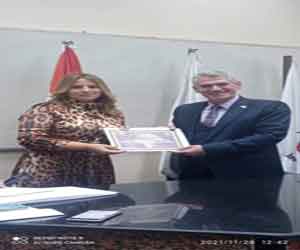 |
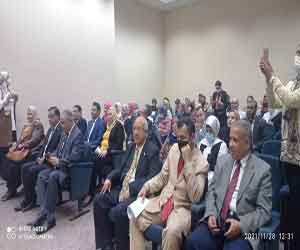 |
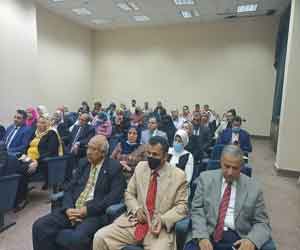 |
||
This report begins with the events and changes that occurred in the beginning of 2020, especially the spread of the Corona virus epidemic, which killed about two million people, and had economic and social effects whose repercussions are still continuing.
At the regional level, the report contains the issue of the Grand Ethiopian Renaissance Dam, whose challenges and repercussions emerged significantly during the years 2020-2021 AD, and preoccupied the peoples of the region, international politics and the major powers in the world, and even their crisis reached the United Nations.
The year 2020 AD also witnessed the development of Israel’s relationship with several Arab countries in a short period of time, as several Arab countries announced the normalization of relations with Israel, so the UAE announced a “historic peace agreement” with the Zionist entity under American auspices, and on October 18, Israel and Bahrain signed an agreement in Manama to establish full diplomatic relations between the two countries, and on October 23, US President Trump announced the normalization of relations between Israel and Sudan, stressing that the two countries had achieved (peace), and on December 10, 2020, Trump announced that Morocco had pledged to normalize its relations with Israel and that the United States recognized Moroccan sovereignty over The disputed Western Sahara, and perhaps the axis of normalization of some Arab countries with the Zionist entity, clarifies the extent of its impact on Egypt and the Arab world, and this axis answers the question: Is normalization common interests between its parties or a long-term Israeli plan?
The report also dealt with water issues, the environment, the political and economic map, human and social development in the Middle East, and strategies for water problems and solutions. The report also included an important focus on economic studies, the role of the International Monetary Fund in the Middle East, and the efforts of the United Nations in achieving the goals Sustainable development in the Middle East, in addition to the axis of historical studies, which deals with the Turkish role in the eastern Mediterranean, the crises, challenges and repercussions that have occurred, including the Libyan crisis, and how to address this crisis. There is an important focus on Israeli studies by studying the Israeli interior to know the internal crises; thus understanding the other; and then how to confront it.
We conclude this report with the axis of future studies, which aims to study the current reality in light of the changes of the times in all fields, in order to anticipate the future, and within the framework of the state’s plan for sustainable development, Egypt’s Vision 2020/2030
At the conclusion of his speech, Prof. Dr. Ashraf Moanis expressed his sincere thanks to all those who contributed and participated in the issuance of this distinguished work, headed by the members of the Board of Directors of the Center, the heads of the scientific divisions, and the Research Department of the Center, and thanks are extended to His Excellency Prof. Dr. Salama Al-Attar for his final review of the report, and sincere Thanks to all the professors and researchers who participated in this report from outside the center with their valuable research that enriched the report.
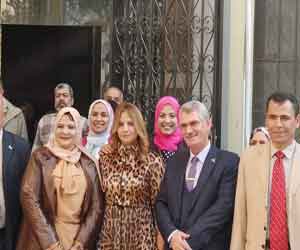 |
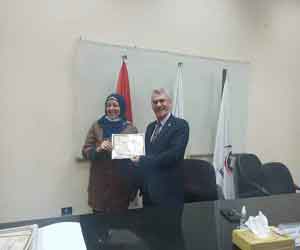 |
||
After concluding his speech, Prof. Dr. Ashraf Monis presented certificates of honor to the researchers and heads of divisions at the center and those in charge of preparing the strategic report in appreciation of their outstanding and fruitful effort to prepare this valuable work.


.svg)




